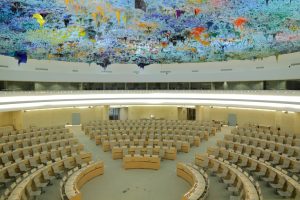The United Nations Human Rights Committee has released its concluding observations about the human rights situation in the Philippines ahead of the country’s fourth Universal Periodic Review (UPR).
The 13-page report highlighted several issues that marked the deterioration of human rights protection in the country under the presidency of Rodrigo Duterte, whose six-year term ended in June.
The report tackled impunity linked to drug-related killings, corruption, violence against women, discrimination, and the crackdown on dissenting voices. While it lauded the passage of progressive measures such as the prohibition of child marriage and anti-bullying efforts, the report noted the alarming rise of human rights violations as state forces brutally enforced Duterte’s “war on drugs” and an all-out-war against the country’s communist insurgency.
Specifically, it mentioned the “incitement to violence against and extrajudicial killings of suspected drug offenders by high-level officials, including the former president.”
The report called for a review of the Anti-Terrorism Law, a priority legislation of Duterte, since it lacked “meaningful consultations” when it was adopted and has “overbroad and vague definitions of terrorism.” It cited how the law was used to “legitimize the targeting of government critics, human rights defenders and journalists, including through ‘red-tagging,’ and consequent chilling effects on freedoms of expression, peaceful assembly and association.”
This is a rebuke of Department of Justice Secretary Jesus Crispin C. Remulla, who told U.N. experts in Geneva in October that the practice of “red-tagging” is not a threat to rights since it is part of democracy.
Remulla will return to Geneva in time for the UPR as he vowed to share the initiatives of the government of President Ferdinand Marcos Jr. “to deliver transformational reform of its justice and law enforcement sectors.” He added that the government is pursuing a comprehensive program called “Real Justice in Real Time.” He is also expected to update the international community about the recent efforts of the government to prosecute the alleged mastermind in the killing of a radio journalist.
The advance report of the U.N. committee gave a glimpse of the possible recommendations that U.N. member states will deliver at the UPR. Will Remulla accept the recommendation for the Philippines to cooperate with the International Criminal Court in its investigation of drug-related crimes?
Reacting to the report, Senate President Juan Miguel Zubiri described it as “unfair” and a rehash of old controversies. He insisted that the rule of law is strong in the country and that citizens are free to criticize the government despite the continuing attacks on the media.
For its part, the Commission on Human Rights said the report is an “objective assessment of the country’s strides, but also a strong reminder of the commitments of the government where it falls short.” It echoed some of the recommendations of the U.N. Committee: “We reiterate our call for the passage of the Human Rights Defenders Protection Bill, including an end to the practice of “red tagging” of human rights defenders, activists, and other advocates. We cannot and should never construe activism as an act of terrorism, but take it rather as sign of the rich tradition of democracy that needs protection. Similarly, we have raised concerns on the weaponization of law to silence critics and perpetuate injustices.”
Civil society groups will also participate in the UPR as they welcomed the recommendation of U.N. experts on how to improve the country’s human rights situation.
Karapatan, a group often “red-tagged” by authorities, also has advice for Remulla and the Marcos government.
“No amount of whitewashing and platitudes can convince the world it is doing enough. The Marcos Jr. government must realize that nothing short of an honest admission of the human rights situation in the Philippines would make this government believable in the eyes of the world. And if the Philippine government wishes respect, it must sincerely promise to stop human rights violations and prosecute past perpetrators,” Karapatan said in a statement.
Marcos is in Cambodia for the ASEAN Summit and East Asia Summit and will then travel to Thailand for the APEC summit, where he is expected to promote the country’s economic potential. He might repeat his earlier appeal at the U.N. General Assembly for urgent climate action and global cooperation.
But equally important in defending the country’s international standing is the UPR taking place on the other side of the world. Marcos may have diplomats and government representatives to articulate the position of the Philippines, but it will be difficult to deny that since taking office in July, he has said nothing substantial or concrete about his human rights agenda.

































